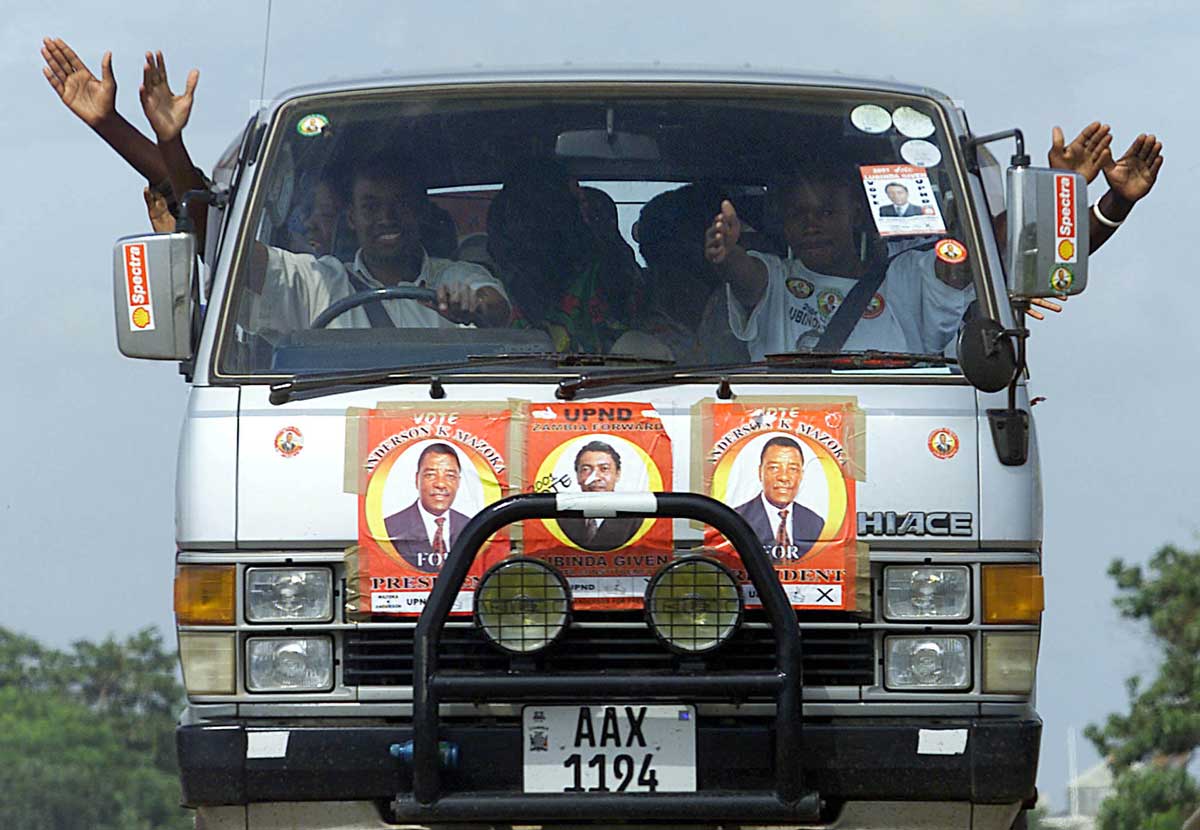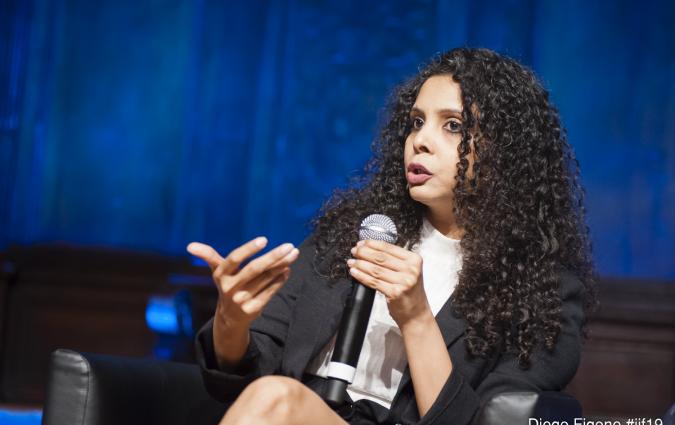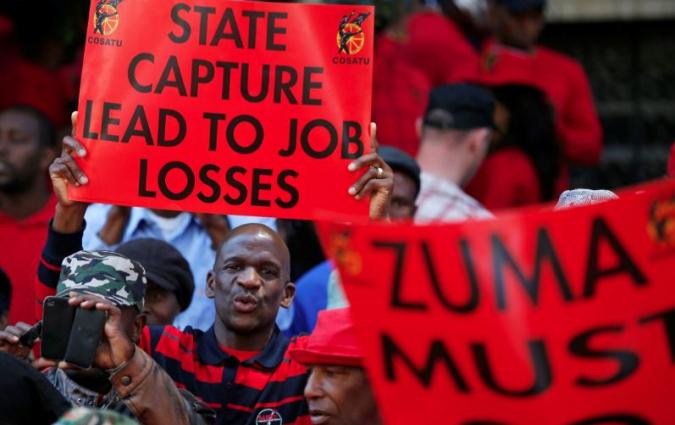In this piece
Driving for change: How to rid Zambian journalism of ‘blalizo’

Zambians wave from a minibus taxi. For many, this is the only affordable form of transportation. REUTERS/Juda Ngwenya
In this piece
What is blalizo? | "An affront to credibility" | A magnet for scam artists and imposters | A focus on radio | No easy solutionsIn the intricate tapestry of Zambia’s media landscape, a perplexing phenomenon known as “blalizo” has emerged, casting a shadow over the credibility and professionalism of journalism in the country.
What is blalizo?
Introduced by press conference and event organisers, blalizo was originally intended as a transport refund to entice more underfinanced media outlets to travel to cover their events. Today it is being abused as a supplementary income that interferes with the impartiality of news.
A nuanced view of blalizo requires an understanding of both Zambia’s transport infrastructure and media landscape. A 2013 paper by the Zambia Institute for Policy Analysis and Research describes public transport in the country as “blighted by problems”, including poor service quality, poor route configuration and unaffordable passenger fares.
And, as in many countries, the media sector is struggling too. Journalists are often paid below a living wage and some even work in an entirely voluntary capacity.
This begs the question: is blalizo a journalistic problem to be solved through ethics training, or a media ownership problem to be solved through fair labour practices and employment conditions? As Zambia Daily Mail’s Integrity Committee secretary Emelda Musonda put it: “The responsibility to provide logistics for covering events lies squarely on the shoulders of employers.”
"An affront to credibility"
Writing in a November 2019 column for Zambia Daily Mail, Musonda called blalizo an “affront to media credibility.”
“The corporate world, civil society organisations and members of the public who interact with journalists […] have lamented how they have been harassed for failure to provide transport refund,” she wrote.
As a steering committee member for WAN-IFRA Women In News, Musonda recounted her own encounter with journalists demanding blalizo: “Journalists swamped the project manager from Zimbabwe demanding lunch coupons and transport refunds. They refused to leave; they followed her wherever she went until she organised some funds outside the event budget. Even then the money ran out because the journalists were too many. As the host and a journalist, I was terribly embarrassed, to say the least.”
A magnet for scam artists and imposters
The phenomenon of blalizo has also led to a rash of journalistic imposters. As Musonda puts it: “These are people masquerading as journalists when they are not. They move from one event to the other soliciting for transport refunds.”
I’ve witnessed this phenomenon myself, where non-journalists are so bold as to pose questions at press conferences with government ministers – one memorably posing a reporter from a famous beauty brand.
A focus on radio
To better understand the phenomenon, and possible ways to address it, I spent my fellowship at the Reuters Institute talking to 21 radio journalists and station managers across the country. I chose to focus on radio, and community radio in particular, because the medium continues to provide a vital platform for local voices, broadcasting in languages that resonate with their communities.
My questionnaire provides a revealing glimpse into the challenges faced by these journalists, from low wages and disrespect to the polarised debate over whether blalizo should continue. The respondents' perspectives illuminated the need for systemic change: 71% of journalists wanted a national code of conduct to provide guidance on these issues, and 86% supported the introduction of a minimum wage for journalists.
But long-form interviews with managers and owners presented a more divided outlook on both ideas.
Radio Chimwemwe’s Station Manager, Isaac Kikanda, said the industry was suffering because there are too many radio stations. He thought introducing a minimum wage was a good idea, because it would weed out stations who could not afford to pay their workers correctly.
Joe Chilaizya, a station manager for a privately owned radio station, was not sold on the idea, and said most journalists are “totally oblivious” about how much it costs to run a radio station, and that media houses are straining under the weight of crippling tax obligations. Anyone setting out to open a radio station in 2023, he said, would need to figure out how to make a profit without advertising, which is increasingly hard to sell.
Mike Daka, a renowned veteran journalist and the founder of Breeze FM, thought introducing minimum wage was the “only way to ensure journalists are paid well.” He added that commercial stations should be expected to pay well above the minimum, as they could afford to pay for good talent.
Most managers want a national code of ethics, but no one is sure how it would work. Albert Mwiinga, station manager at Byta FM, said media houses were unlikely to co-operate and reach agreement without some government intervention: “This requires support of broader regulation; until we deal with this, it will be a thorn in the flesh. But journalists need to decide to bring back good conduct.”
Daka agreed that blalizo was an alarm sounding to show the need for clearer expectations around what good journalism entails. He said the code should apply to people who pay blalizo, and not just those receiving it.
Chilaizya said he felt the code was necessary, but questioned who would enforce it.
No easy solutions
As the title of my project forewarns (see full PDF), there are no easy answers to blalizo. The debate transcends individual conduct and extends to broader issues within the media landscape.
A suggestion by the government to introduce a minimum wage has the potential to ensure that journalists are paid a living wage, making it feasible to start an open conversation about the ethical implications of accepting blalizo.
Once that conversation has begun in earnest, a secondary conversation can begin about industry support for eradicating blalizo. Ending these payments entirely may prevent bad actors from abusing the job title for personal gain.
But the government and the industry itself will need to undertake a serious nationwide consultation to understand the full implications of all policies before they are implemented, however well intentioned.
What is clear to me is that, regardless of whether any of these changes happen, the owners and the operators of radio stations need to be put on notice to improve working conditions as a matter of national urgency. I hope my project serves as that notice.




